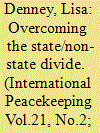| Srl | Item |
| 1 |
ID:
164405


|
|
|
|
|
| Summary/Abstract |
The positive effects of rule of law norms and institutions are often assumed in the peacebuilding literature, with empirical work focusing more on processes of compliance with international standards in war-torn countries. Yet, this article contends that purportedly ‘good’ rule of law norms do not always deliver benign benefits but rather often have negative consequences that harm the very local constituents that peacebuilders promise to help. Specifically, the article argues that rule of law promotion in war-torn countries disproportionately favours actors who have been historically privileged by unequal socio-legal and economic structures at the expense of those whom peacebuilders claim to emancipate. By entrenching an inequitable state system which benefits those with wealth, education, and influence, rule of law institutions have reinforced structural, social, and cost-related barriers to justice. These negative effects explain why war-torn societies avoid the formal courts and law enforcement agencies despite substantial international efforts to professionalise and strengthen these institutions to meet global rule of law standards. The argument is drawn from an historical, comparative, and empirical analysis of the UK-funded justice sector development programme in Sierra Leone and US-supported rule of law reforms in Liberia – two postwar countries often cited as prototypes of successful peacebuilding.
|
|
|
|
|
|
|
|
|
|
|
|
|
|
|
|
| 2 |
ID:
124156


|
|
|
|
|
| Publication |
2013.
|
| Summary/Abstract |
This article explores Western attempts to strengthen mechanisms of informal justice in Afghanistan. It traces the origins and evolution of an 'informal justice assemblage': the constellation of specific expert discourses, institutional practices, and strategic considerations that made it possible and plausible that Western actors should promote and work with informal processes of justice. The article problematizes expert statements that posit that working with informal justice is somehow more 'Afghan-led' and less of an outside imposition than supporting the country's formal justice system. To the contrary, this article details how - discursively and institutionally - academic authority about what is locally appropriate in practice served to foreclose national debate and scrutiny about the organization and administration of justice. This amounted to a net erosion of accountability, reinforced by the subsequent militarization of the justice sector and governance more broadly. In conclusion, the article calls for greater attention to the broader fields of power in which claims of sensitivity to the local sentiments and reality in Afghanistan are made.
|
|
|
|
|
|
|
|
|
|
|
|
|
|
|
|
| 3 |
ID:
133141


|
|
|
|
|
| Publication |
2014.
|
| Summary/Abstract |
Despite the widely accepted recognition that fragile and conflict-affected countries are characterized by plural security and justice orders, donor-led security and justice programmes continue to engage overwhelmingly with state actors on the basis of liberal peacebuilding models that internalize Weberian understandings of the state. In addition, policies pushing reformers towards engagement with 'informal', 'non-state', or customary systems often do so in a way that suggests a neat separation between the 'state' and 'non-state'. This does not reflect how security and justice operate in practice. This paper uses the case of Sierra Leone to demonstrate the panoply of actors that constitute the plural security and justice context there, and how these actors interact in practice. This reveals the highly interactive nature of the multiple security and justice chains commonly used in Sierra Leone. It is argued that in order to meaningfully engage with the multitudinous ways in which people access security and justice, external reformers need to develop a comprehensive understanding of this complexity. Such an understanding will assist reformers in transcending the increasingly unhelpful state/non-state distinction and in engaging with security and justice from the perspective of the end users, rather than from the perspective of externally derived models.
|
|
|
|
|
|
|
|
|
|
|
|
|
|
|
|